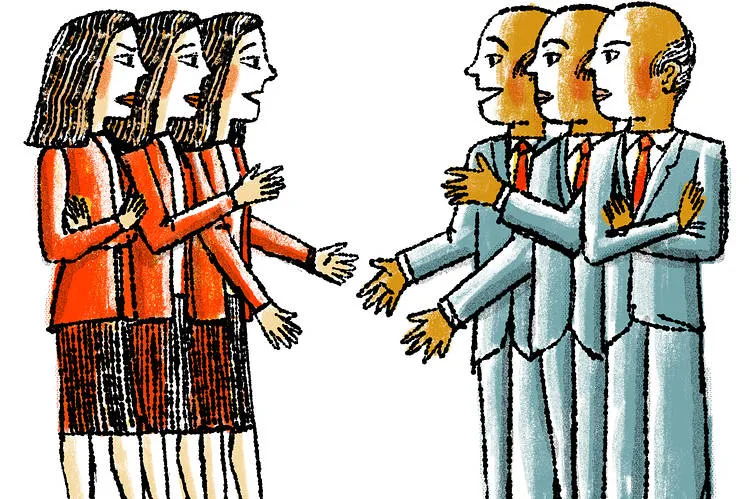
In today’s digital landscape, constructing one’s identity has developed in new and significant ways. The concept of “Interactionism,” which emphasises the dynamic interplay between individuals and their social environment, has renewed relevance in this virtual realm.
As a result, it has become increasingly important to understand how identity formation occurs in the current digital age.
Cooley’s theory of the “looking-glass self” provides a valuable lens through which we can understand how our sense of self is influenced by societal reflections, a phenomenon that has gained heightened significance in the digital world.
The likes and comments become a form of validation, shaping and reinforcing our sense of self. The looking-glass self becomes a dynamic process, influenced not only by offline interactions but also by the virtual personas we construct.
Furthermore, the digital world has introduced a new level of control over how people construct their identities. By selectively highlighting various aspects of themselves, individuals can assert their own power and create a definition of themselves that goes beyond physical limitations. This flexibility allows experimentation with different parts of one’s identity, leading to fluidity and adaptability. This newfound control enables individuals to actively shape their self-concept, resulting in a greater understanding and acceptance of their intricate and interconnected identities.
The Dark Side of Digital Identities
However, the digital world also presents challenges. The proliferation of filter bubbles, for example, can reinforce narrow, homogeneous identities. In these spaces, individuals may be surrounded by like-minded individuals, limiting exposure to diverse perspectives and experiences. Another complication is the potential sense of disconnection between our digital and offline selves. It becomes essential to critically evaluate the authenticity of our online interactions and their impact on our sense of self.
Conclusions
The digital realm serves as a canvas for self-expression and exploration, offering individuals a platform to actively shape their identities. Navigating this landscape requires a thoughtful consideration of the authenticity and impact of our digital interactions. Embracing the complexities of identity in the digital age empowers individuals to foster genuine connections and contribute to a more inclusive and understanding society.
Reference List:
^ Cooley, C. H. (1902). Human Nature and the Social Order. New York: Scribner’s.
^ Goffman, E. (1959). The Presentation of Self in Everyday Life. Anchor Books.
^ Seth Flaxman, Sharad Goel, and Justin Rao. Filter bubbles, echo chambers, and online news consumption. Public Opinion Quarterly, page nfw006, 2016.







I really like the idea you bring up about people in the digital world being able to shape their identities across physical boundaries. A large part of the uncontrollability of people’s identity in the digital world is due to the rapid advancement of technological techniques nowadays. The technology can be used to make people feel happier by beautifying themselves, as you have shown, but it is inevitable that some people will use it for bad purposes, making “what you see is what you get” untrustworthy in the digital world. Is there any way that you think this situation can be improved?
Thank you for your comment! Regarding your question, I think there are many ways through which we can improve this situation. We could prioritise digital literacy education to foster responsible online behaviour, enforce transparent policies on digital alterations, or implement regulations to govern ethical technology!
Can you think of some other ways?
Amazing post!!
Being honest I found your post very easy to read and interesting thanks to the examples. I really think it is better to understand what you wanted to mean through this topic with the way you structured the post. Moreover, I agree with everything, it is true that nowadays, as you said, individuals can choose which aspects of themselves want to share on social media.
However, I would like to know if you think that being able to build you own identity in the digital era has any advantage?
I think it can have some advantages. For example, it facilitates global connectivity with individuals who share similar interests and inclinations. Beyond mere socialisation, the digital landscape creates opportunities for networking, skill development, and the cultivation of personal brands, particularly advantageous for entrepreneurs. Cultural exchange is also fostered as people share aspects of their culture online.
So while there are challenges, such as privacy concerns and the potential for echo chambers, the ability to shape one’s digital identity can also empower individuals in many ways.
Hello,
This blog has forced me to reconsider how identities are constructed in the digital age, particularly in light of interactionism theory and the peephole self. It has also caused me to reflect critically on my own behavior on social media in general. Likes and comments, for instance, are examples of how social media interaction can become a kind of validation that affects how we see ourselves. This realization caused me to start thinking about how my own behavior on social media affects how I see myself.
And the section on our degree of agency in creating a digital identity—that is, deciding which facets of ourselves to highlight in the virtual world. This independence allows us to explore and express ourselves more freely in the digital sphere, but it also acts as an echo of the system and is another way that I demand validation for myself. This may also be connected to the filter bubble effect: the more I want to be accepted for who I am and what I believe in, the more likely I am to willingly surround myself with like-minded individuals, forming a cocoon of knowledge and disregarding information and opinions from outside the circle.
Hello~ I really like the content and structure of your blog, Cooley’s theory of the ‘mirror self’ is a really fresh and interesting one. And you also mentioned that identity-building in the digital world allows for a level of self-empowerment and self-definition that transcends physical boundaries, which is really great!
In the end, you mentioned the dark side of digital identities, and I think that the situation you mentioned “where individuals may find themselves surrounded by like-minded people, limiting exposure to different perspectives and experiences” is what is known as the echo chamber effect in social media. This is the so-called “echo chamber” of social media, a closed loop of information caused by the algorithmic push of social media, which I agree with and which is, in my opinion, one of the major problems of social media!
You can read more about the “echo chamber effect”. I’ll leave you with this question: Is there anything we can do to break through this push?
I appreciate your positive feedback on the content and structure! Regarding the question about breaking through the “echo chamber” effect in social media, I think we could consider diversifying our sources, practising critical thinking, engaging respectfully in discussions, limiting algorithmic influence, educating ourselves about how algorithms work, and advocating for transparency. These strategies can help create a more diverse and informed digital experience.
I think the point you made in your blog about shaping your sense of self is very interesting, can I understand that in the digital age, we are greatly affected by external forces, and even these forces can change our personality. This can be extended to the functionalist view – mental states are identified by what they do rather than by what they are made of. In addition, the disclosure of online privacy also needs to attract people’s attention, and the sense of proportion also needs to be grasped by media consumers themselves.